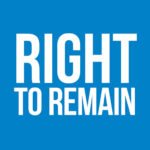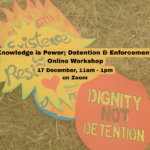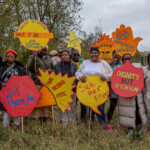2012 saw mass deportations of Tamils to Sri Lanka continue, despite credible evidence of torture of returnees. Lisa of NCADC South explains what’s happening, and what we need to do to stop it:
The Sri Lankan civil war and asylum seekers in the UK
In May 2009, Sri Lanka’s 27-year-long civil war officially ended. A war that had caused the displacement of 290,000 people and over 70,000 deaths – some figures place the total death toll as 100,000. UN figures show 40,000 of these were in the final weeks of the war. In 2011, the UN accused both sides in the conflict of engaging in war crimes.
The civil war, then, was clearly a period of widespread violence, death and displacement. But with a ceasefire holding and the war considered to be over, why do Sri Lankan asylum seekers in the UK not want to return?
Sri Lanka is no longer at war but human rights violations abound. In its 2012 annual report, Amnesty International summarised that:
The government continued to arbitrarily detain, torture or ill-treat people and subject people to enforced disappearance. It failed to address most instances of impunity for violations of human rights and humanitarian law.
These human rights violations are committed against both Sinhalese and Tamil citizens, explaining the presence of Sinhalese asylum seekers in the UK. Tamils are at greater risk, however, as their ethnicity alone may be enough to put them in a risk category.
Deportations/removals
 To understand the context in which refused Tamil asylum-seekers are being put at risk, it is helpful to know a little about the deportation machine. I will use the term ‘deportation’ in its popular meaning – i.e. any enforced removal, but the term actually has a distinct legal meaning in the UK, referring to enforced removals for the sake of public safety (usually applied to foreign nationals with criminal convictions in the UK). For more information on the differences between these terms, take a look at the glossary of terms in our campaigning toolkit.
To understand the context in which refused Tamil asylum-seekers are being put at risk, it is helpful to know a little about the deportation machine. I will use the term ‘deportation’ in its popular meaning – i.e. any enforced removal, but the term actually has a distinct legal meaning in the UK, referring to enforced removals for the sake of public safety (usually applied to foreign nationals with criminal convictions in the UK). For more information on the differences between these terms, take a look at the glossary of terms in our campaigning toolkit.
Individuals without leave to remain in the UK, and who have exhausted their legal options to try and obtain this leave, are at risk of enforced removal from the UK if they do not leave of their own volition. Asylum seekers and other migrants are usually detained at this point, and issued with removal directions (often called a ‘ticket’ by migrants). Occasionally, Sri Lankans are removed on commercial flights, the kind of flight you might take on a business trip or holiday. Usually though, the UK Border Agency charter a private flight for deporting Sri Lankans.
Why do UKBA use private charter flights? Let David Wood, who was strategic director for UKBA at the time of this interview with the Daily Telegraph in 2009, answer that :
“The Government started using charter flights in 2001. It was a response to the fact that some of those being deported realised that if they made a big enough fuss at the airport – if they took off their clothes, for instance, or started biting and spitting – they could delay the process. We found that pilots would then refuse to take the person on the grounds that other passengers would object. So although we still use scheduled flights, we use special flights for individuals who are difficult to remove and might cause trouble .
But the effect of the charter flights is actually much greater than the numbers themselves might suggest. It sends out a very clear signal that Britain is determined to enforce its immigration policy. And that has an important impact on deterring people who do not comply with our rules or who are not entitled to be here from attempting to stay, because they see that we will succeed in removing them.”
In addition to Sri Lanka, the countries to which the UK has deported people by charter flights are Kosovo, Albania, Roma to Czech Republic (before the Czech Republic joined the EU), Afghanistan, Iraq, Cameroon, DR Congo, Nigeria, Pakistan, Ghana and Jamaica. Charter flights are extremely problematic, and NCADC would argue the policy itself of using charter flights potentially breaches human rights law. Because of the costs involved, UKBA policy stipulates that if your case is awaiting Judicial Review at the high court (normally enough to prevent a removal), this will not act as a bar to removal. An injunction (emergency interim relief from the High Court) is needed. The sheer numbers of people being deported – there are often around 80 migrants on one flight – mean that people often fail to get proper legal representation and other support in the short-time frame allowed , and so its questionable whether due process is being followed.
The flights also depart from undisclosed airports and are operated by undisclosed companies, meaning that they are not open to public scrutiny and we are fearful for the safety of deportees on the way to, during, and after these flights. There is also the highly controversial practice of the use of ‘reserves’, described by even the Home Affairs Select Committee as ‘inhuman’. Airline campaigning in an individual case – encouraging a commercial airline to refuse to carry someone against their will – is not possible when charter flights are used because the flight details are not revealed.
What is happening to returnees?
NCADC believe, with many human rights organisations across the world, that refused Tamil asylum-seekers are at risk by mere virtue of being in that category. Human rights groups report continued discrimination, harassment, and violations against Tamils in general in Sri Lanka, and being forcibly returned from the UK enhances the risk. This is because it is easier for the Sri Lankan government to identify you because of your arrival at the airport; and it is assumed your asylum claim in the UK was based on being linked to LTTE (the Tamil Tigers). Many Tamils are, solely because of their ethnicity, assumed to support and have links to the LTTE by the Sri Lankan government and their security forces.
Concerns about the torture of returned refused asylum-seekers (not just from the UK) have been raised since 2010, with human rights groups providing credible evidence of this practice. Freedom From Torture – who work with torture survivors in the UK – have published a series of reports of their findings (based on the evidence of their clients who have been returned to Sri Lanka, and torture survivors they have worked with in the UK). Their November 2011 report found:
- Torture perpetrated by state actors within both the military and police has continued in Sri Lanka after the conflict ended in May 2009 and is still occurring in 2011
- Those at particular risk of torture include Tamils who have an actual or perceived association with the Liberation Tigers of Tamil Eelam (LTTE)
- A variety of different types of torture have been perpetrated in a significant number of locations around Sri Lanka during the post-conflict period
- A wide range of different forms of torture have been used, often in combination, to inflict severe suffering on victims of torture with devastating psychological and physical consequences
- Many Sri Lankan torture victims are left with visible scarring attributable to both blunt force trauma and burns which suggests impunity for perpetrators of torture in Sri Lanka [ie the torturers aren’t even bothering to hide the evidence of torture]
Their evidence consists of expert reports on scarring, psychological evidence, and the case studies built up a consistent picture of certain types of torture used in different prisons/areas of Sri Lanka, independently corroborated by different witnesses. It is worth noting that torture is not just used against returnees – it is widespread and of very real concern, as the Asian Human Rights Commission has reported.
The UK government persisted in deporting Tamils in spite of this evidence, which lead to Human Rights Watch calling for an end for the deportations. In February 2012, with yet another charter flight scheduled, Human Rights Watch said:
“The United Kingdom should suspend deportations of ethnic Tamil asylum seekers to Sri Lanka and immediately review its policies and information about the country’s rights situation used to assess their claims. Research by Human Rights Watch has found that some returned Tamil asylum seekers from the United Kingdom have been subjected to arbitrary arrest and torture upon their return to Sri Lanka.
Human Rights Watch has documented eight recent cases in which people deported to Sri Lanka have faced serious abuses. A Tamil deportee from the United Kingdom, RS (a pseudonym for security reasons), said that army soldiers in Sri Lanka arrested him on December 29, 2011. He alleged that during interrogation he was beaten with batons and burned with cigarettes, and that his head was doused with kerosene. He also said that his head was submerged in a bucket of water, that he was hung upside down, and that hot chilis were placed under his head and chest. He said that as a result of this torture, he confessed to being a member of the separatist Liberation Tigers of Tamil Eelam (LTTE), which were defeated in May 2009. He said that he paid a substantial bribe to escape from detention, and fled back to the United Kingdom, where he has applied for asylum.
Human Rights Watch has also documented cases of Tamil deportees who alleged to have been subjected to rape as a form of torture upon their return to Sri Lanka. .Human Rights Watch has obtained medical evidence supporting each of the claims of torture.”
While in February 2012, the High Court refused to accept Human Rights Watch’s evidence as a reason to halt deportation in some cases, evidence has continued to mount. New evidence was published by Freedom from Torture in September this year, which showed:
“the risk faced by Tamils returning to the country from the UK. The latest research relates to 24 people who were tortured in Sri Lanka after returning voluntarily from the UK since the end of the civil war in May 2009.
In the vast majority of cases, individuals were in the UK on student visas and returned to Sri Lanka – mid-studies and with the intention of a short visit – for family reasons. After arriving back in Sri Lanka they were targeted for detention and torture due to a real or perceived association with the LTTE and, in many cases, their alleged support for the LTTE whilst in the UK or even just their knowledge of LTTE activity in the UK.
The returnees were subjected to a range of torture methods including deliberate burns with cigarettes and heated metal instruments, beating with PVC plastic pipes or whipping with cables and partial asphyxiation using water or plastic bags containing petrol. Such ill-treatment has inevitably resulted in long-lasting physical and psychological injuries.”
Freedom from Torture’s research attracted unfavourable attention from the Sri Lankan government, but it seems to have been worth it. The Guardian reported that many asylum seekers with tickets for the October charter flight managed to secure last-minute injunctions (stopping their removal) and a significant number of these were based on Freedom from Torture’s evidence. It is thought that 60 individuals were given tickets for the flight and Sri Lankan sources reported that 28 people arrived in Colombo airport, so it is possible to assume that perhaps half of the individuals were saved at the last-minute.
Those who were not so lucky were almost certainly arrested on arrival, as media reports suggest. This has been widely reported in the cases of forcible removals from Australia. Most people are reported to be released in the days after (usually after paying a bribe), but there is strong evidence that these individuals – now identified – are subsequently picked up again and subjected to mistreatment and torture.
Why aren’t Tamil asylum-seekers getting protection in the UK?
Failures of the asylum system
We first need to consider the systemic problems with the asylum system in the UK. The culture of disbelief at the Home Office means that it is assumed all asylum seekers are lying unless they can prove otherwise. And this proof is very difficult to obtain. Most decisions are based on a series of hostile interviews where the intention is to trip the asylum seeker up. Claims are refused on the basis of poor credibility – often decided because of a tiny error in dates or peripheral detail, because of ordinary memory recall issues and even more so in cases of traumatic memory. The Centre for the Study of Emotion and Law are a good source for research on this topic, and the truth/credibility question is explored in an excellent article by Melanie Griffiths of Oxford University, a summary of which can be found on the NCADC blog.
It is very difficult to obtain good quality free legal advice, particularly in a time of cuts to legal aid funding and legal aid lawyers being excessively over-worked. These problems are exacerbated in detention, with only certain legal aid firms (some of whom produce inconsistent results, to put it mildly) having contracts to provide legal advice in immigration detention. Many of the individuals NCADC are in touch with were either unrepresented or badly represented at the early stages of their claim. Even if a good lawyer can be found when they are at imminent risk of removal, often the damage has already been done in their case and their credibility is ruined.
These issues – present in far, far too many asylum cases – are brought into stark relief when charter flights are used for deportations. There is a sudden panic as dozens of individuals from the same community receive tickets for the same day. Lawyers and campaigning organisations cannot cope with the amount of work that needs to be done in a very short-period of time, and so people do not have access to justice and are deported to countries where their lives are at risk and they may be tortured. Despite UKBA assurances that they ‘never remove anyone in need of protection’ , the asylum system does not provide protection to many who need it, and as they make no attempt to monitor what happens post-removal, how can they possibly be confident of this? This line from UKBA is trotted out whenever they are required to make a public statement, and has been so oft-repeated that it is easy to overlook the subtle distortion it contains. UKBA do not remove people who have been granted protection – those who have been given refugee status, humanitarian protection or discretionary leave. They do, however, very frequently remove people who need protection. This need has simply not been recognised.
In face of torture evidence, why are we still returning Tamils?
The risk to an entire group of people forcibly removed from the UK is rarely as clearly documented as it is in the case of refused Tamil asylum-seekers. Why then, does the UK government persist in doing so, when to return someone to torture is in breach on international law? As Jerome Taylor of the Independent put it, “How dare we allow people to be transported to regimes we know go in for this abuse?” [This article unfortunately no longer appears on the Independent’s website).
There is undoubtedly a political agenda at play here. Governments committing human rights abuses are rarely wont to admit it, and in particular post-war countries are often keen to present an image of a stable, democratic nation in which business development and tourism would be safe. There is presumably pressure from the Sri Lankan government on the UK government not to undermine this picture.
UKBA commonly use country of origin evidence supplied by the British embassy/high commission in the country of origin. This is clearly problematic as there is a conflict of interest in providing objective evidence of human rights concerns (if they exist) and furthering positive diplomatic relations with regimes. In the case of Sri Lanka, the Foreign Office has asserted that torture is not taking place because Sri Lankan government officials have said it is not. The Foreign Affairs parliamentary committee has raised concerns about this conflation of responsibilities. In its report on the Foreign Office’s human rights work in 2011, the committee concluded that:
“We find it unsatisfactory that the Government has not been more forthcoming to Parliament about its efforts—in general and in specific cases—to assess the level of risk to the safety of those who are removed from the UK”
and
“We encourage the FCO to be energetic in evaluating reports by non-governmental organisations and media sources of torture of deportees from the UK, including in Sri Lanka, and in spelling out the risk to the UK Border Agency. We also request that the Government clarify the division between the roles of the FCO and of the UK Border Agency’s Country of Origin Information Service in gathering the intelligence needed to make accurate assessments of the risk to deportees upon their return to their country of origin”.
There have even been cases of Sri Lankan asylum seekers’ files – including confidential material – being shared with Sri Lankan embassy officials in the UK by UKBA.
The situation becomes even murkier when one considers the UK’s business interests in Sri Lanka. Campaign against the Arms Trade report that during the ceasefire between the Sri Lankan government and LTTE from 2005 to 2008, the UK government approved arms export licenses worth a total of £18 million. Now, in the post-conflict period, the UK continues to licence arms sales to Sri Lanka. Big business opportunities are not restricted to arms sales. The three-year rehabilitation and development programme planned for Sri Lankan involves significant projects that UK firms will want to win contracts for. One of these firms, the Sri Lankan Development Trust, was set up by the former Minister of Defence, Liam Fox, and he is not the only senior politician with known business links to the Sri Lankan government. For more on this, see the Sri Lanka posts on the Stop Deportations blog.
What’s being done and what can be done?
The evidence of torture of Tamils returned to Sri Lanka paints a bleak picture. There also seems to be political intransigence, allowing the UK to remove individuals to a breach of their Article 3 ECHR rights. There is, however, a lot of energy behind different campaign strategies.
Research/legal efforts
Work is being done to document the torture risk, and is being shared as widely as possible. If you know a Tamil asylum seeker who is returned, please try and keep in touch with them if it will not put them at risk, as their evidence may be important.
If you are in touch with any Sri Lankans at risk of removal, you direct them to the collected materials on risk on return, as it may be useful for their legal case (good lawyers will be aware of it, but there are sadly not enough of these). Last-minute legal actions, while stressful and far from ideal, have been effective in stopping people being removed. This is not a long-term solution though, as individuals with injunctions stopping one flight have been issued with a ticket for a subsequent flight even when the injunction was granted on the basis of ‘credible evidence of risk of torture’. The more asylum seekers who are linked into groups who know about these legal efforts, the more chance they have of succeeding.
Awareness-raising/networking
The torture risk has been getting more mainstream attention through The Guardian, The Independent and Channel 4’s coverage of the legal efforts, the torture risk, and the charter flights themselves. We feel that this coverage has not adequately addressed why the UK government is still removing people if the risk is clear. The business connections need to be brought out into the open.. The public more broadly don’t know about any of these issues , and they should know what’s being done in their name.
We need political will to make these deportations stop and MPs will only put pressure on government if they feel their constituents care about this issue. You can talk to your MP about this issue, and ask for clear, obtainable things to be done – such as a question to be asked in the House of Commons, a collaborative investigation into the claims of torture, or a parliamentary group/enquiry to look into the issue.
More networking and co-ordination is needed. Other countries are deporting Tamils, and we must share information, campaign strategies and action plans. This is particularly the case with Australia – the first refugees transferred to Nauru were Sri Lankan – but applies to other countries too.
Community and direct action
It’s important to strengthen resistance to deportations in the Tamil community. There have been efforts made to do this in the last year or so, but there are significant barriers to community mobilisation. The community is fractured and fearful because of what Tamils have experienced and the very worrying level of surveillance of Sri Lankans abroad by security officials.
There has a community response, however, including direct actions that have taken place before charter flights – notably attempts to blockade the detention centres to prevent the coaches carrying the deportees from leaving.
In this video, a No Borders activist explains why he took action:
Ethical Tourism
Another campaigning opportunity has arisen, following Lonely Planet choosing Sri Lanka as the country to visit in 2013.
The Sri Lanka Campaign presents an alternative view on their webpage about Ethical Tourism:
“Sri Lanka is a stunning island with beautiful sights, amazing landscapes, incredible wildlife, wonderful food and friendly people. It is not surprising that each year nearly a million people from all over the globe visit to experience the hospitality and sights on offer. Sadly, however, visitors to Sri Lanka are in real danger of inadvertently supporting alleged perpetrators of war crimes and human rights abuses, both financially and politically.”
The website has some helpful suggestions of how you can visit Sri Lanka in an ethical way.
Spread the word
We are told daily that the British public is anti-immigrant, and that human rights means terrorists staying in the UK. We are not told daily about the UK delivering people to torturers. I refuse to believe that the public think it is ok to deport people to torture, and that someone’s life is not worth protecting if they do not have a British passport. Is it our job – all of our jobs – to explain what is happening, engage people with this profoundly important issue and inspire people to take positive action for the sake of others, and for the sake of ourselves.
Reclaim human rights!



















Discussion: